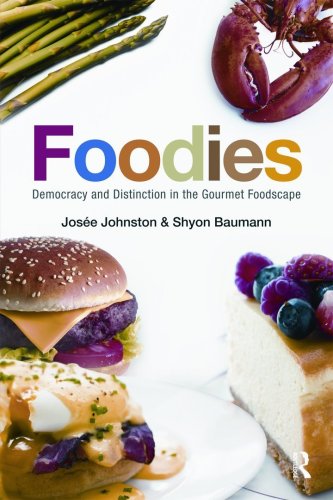I have a confession. I don’t consider myself a “foodie.” In my blog, Folks Gotta Eat, I curate and filter a lot of information related to food, but I’m more concerned with the politics and policies of food security than I am with the latest hip eatery, or even reports of undeniably good pie at some truck stop out on the 401. I do not know the names of acclaimed chefs — unless they are food security activists — and I never watch the Food Network (I don’t even own a television). I was talking with a food security activist the other day, and she revealed that she wears a button on her clothes, usually tucked out of sight, that says, “F@#K Foodies!”
Here’s the kicker, the fact that I am opening this review with a mini self-defense of my non-foodie status plays right into the key arguments of the authors and their examination of foodie discourse.
While foodie status is frequently defended as being universally accessible, interestingly, one of the primary reasons that the term foodie is rejected is because it is associated with snobbery and the faddish trend-setting of elites.
So yeah, I don’t want to be elitist, but my position in society already affords me elite opportunities and access related to food. That can’t be denied. The book, Foodies: Democracy and Distinction in the Gourmet Foodscape explores the ongoing tension between the two stories about food: good food as democratic, and food as a source of status and distinction for economic and cultural elites. Johnston and Baumann insist that foodies cannot be fully understood by either story told on its own, and they do a darn good job of making the case.
Important questions emerge in their examination, such as, “Put differently, is gourmet globe-trotting an extension of culinary colonialism, or does it represent a meaningful attempt to experience cuisines (and people) outside the Western culinary canon?” The authors also examine two key elements of foodie discourse — the search for authenticity and exoticism in the foodscape, and explore the subsequent class and race boundaries erected or maintained, therein. They end with a discussion of the trend in foodie discourse toward environmental politics, but note the disconnect still present in identifying larger ethical connections and concerns.
To the extent that foodie discourse promotes consciousness of the ramifications of food choices, it tends to be much more concerned with environmental issues than with issues of fair working conditions, workers’ health, or economic inequality, and its primary focus is on identifying eco-food choices that are high-quality, authentic, exotic, and ultimately delicious.
The authors’ working definition of a foodie is “somebody with a strong interest in learning about and eating good food who is not directly employed in the food industry.” Okay, fine. I’m a foodie. That also means I’m part of a large, on-going discourse about food, culture, class and social, environmental and animal justice. As the foodie conversation evolves, we must repeatedly bring it back to the global realities of economy, class, race and culture.
In short, while not all food adventurers are economic elites, it is virtually impossible for an impoverished, or marginalized, person to fully participate in foodie culture as a consumer and food adventurer, rather than as a dishwasher in a fashionable restaurant, or subsistence farmer harvesting cocoa beans for a gourmet chocolate bar.
Melanie Redman blogs at Folks Gotta Eat and rabble.ca.




